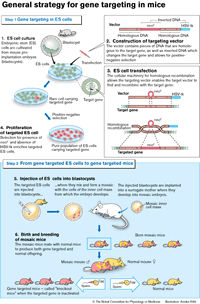Large-scale genomic analysis of prostate cancer unveiled
Advertisement
A unique collaboration among physician-scientists at Memorial Sloan-Kettering Cancer Center (MSKCC) has yielded the most comprehensive genomic analysis of prostate cancer to date. "Genomic studies in other cancer types have resulted in new drug targets and strategies to classify patients into clinically meaningful subgroups that improve treatment decisions," said senior study author Charles Sawyers, Chair of the Human oncology and Pathogenesis Program at MSKCC and a HHMI investigator. "This first -ever database of its type brings us one step closer to achieving that goal in prostate cancer."
The study, published in Cancer Cell , provides a previously unavailable genomic analysis whose scope and size offers new insight leading to more effective diagnostic tests as well as future treatment options for prostate cancer patients.
"We have used all of our expertise and resources to complete a large-scale study of the changes in the genomes of patients' prostate cancers," says Dr. Sawyers, who explains that prostate tumor cells are very difficult to work with despite the fact that prostate cancer is the most common cancer in men. Consequently, there have been fewer genomic studies in prostate cancer compared to other tumor types such as lung cancer. "The ability to collect and analyze these tumor samples is a testament to the collaboration and expertise across many disciplines."
The MSKCC team, composed of members of the Human Oncology and Pathogenesis Program, urology, medicine and genitourinary oncology services, pathology, computational biology, and statistics departments, used an integrated, comprehensive approach to analyze 218 primary and metastatic samples and 12 cell lines. All samples were procured from patients treated by radical prostatectomy at MSKCC. The analysis revealed a much higher frequency of alterations in the androgen receptor pathway than previously suspected. Also, the pattern of DNA copy number alterations identified defined subsets of low-and high-risk disease beyond what is revealed by Gleason score.
"One of the holy grails of prostate cancer is to identify which tumors need to be aggressively treated and which don't," said Dr. Sawyers. "Ultimately, what we have learned could lead to the creation of a genetic-based test to determine which prostate cancers might become more virulent and require aggressive treatment and which tumors may not." According to Dr. Sawyers, "This data clarifies the role of several known cancer pathways and provides important clues into others. We have gained insight into the importance of androgen receptor status—and why some men respond to hormone therapy and others don't."























































